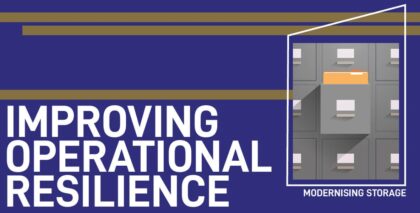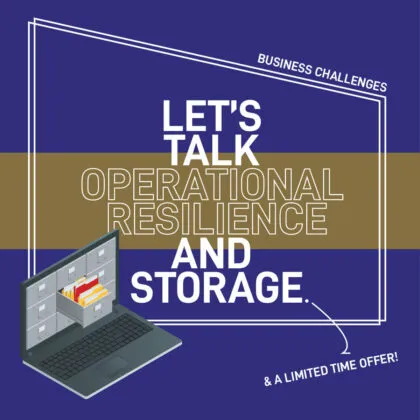Improving Operational Resilience (With AI-driven Technology)
Time to read: 10 mins
In the past year, half of all UK businesses experienced some form of cyber security breach or attack.
The 2024 Cyber Security Breaches Survey examined the different cyber-attacks and cyber-crimes faced by over 2,000 businesses and educational institutions. The survey aligns with the UK’s National Cyber Strategy and informs government policy, making the UK cyberspace a secure place to do business. Topics like operational resilience, business continuity, and cyber hygiene remain an urgent priority.
Interestingly, larger businesses are more likely to experience an attack (almost 75% reported some form of cyber-attack), but smaller organisations may be at higher risk. Smaller companies may not have the necessary in-house expertise to effectively manage security risks and, in the current climate of rising costs and overall economic uncertainty, cyber security might just be another priority competing with a host of other IT challenges.
The consequences of cyber-attacks is widely recognised, with numerous high-profile incidents frequently making headlines. Financial impact is common with significant losses incurred from remediation costs, legal fees, increased insurance premiums and potential fines from regulators.
Beyond commercial impacts, cyber-attacks can severely damage a company’s reputation, leading to a loss of customer trust and loyalty. Additionally, operational disruptions caused by cyber-attacks can result in downtime and negatively impact revenue, further compounding the economic strain on the affected business.
Jump ahead to the insights affecting you right now or read on to learn how operational resilience can be achieved (and simplified) through a storage strategy.

The Financial Impact of Cyber Attacks is Underestimated
On average, analysts have discovered, a cyber-attack will force a UK SME business to stop trading for an average of four days – and businesses that have experienced a breach in the past, the economic loss of being offline for this time was estimated at £123,984. For SMEs that have not been victims of a cyber-attack, they calculated the loss to be £39,633 – more than a substantial 68% lower. It’s clear that SMEs who have not yet experienced an incident are drastically underestimating the financial implications.
The Benefits of Quick Recovery
The now-widely accepted reality of cybersecurity is that breaches are inevitable. You might read in columns, headlines or further afield from an industry analyst that security is a kind of anxiously ticking clock. It’s no longer a matter of ‘if’, but ‘when’. Underscoring the urgency of cyber risks and attacks, the ways we talk about defending a business is changing too.
Cyber security cannot be totally focussed on preventing breaches; it’s also about being able to recover swiftly if an attack occurs. Quick recovery minimises downtime, allowing normal operations to resume and reduce any financial impact. It also can enhance customer trust, as it shows that the company is proactive in protecting their data and prepared to handle incidents effectively.
A robust response to cyber threats demonstrates a company’s commitment to maintaining high standards of business practice.
At a quick glance, the benefits of quick recovery are:
- Minimise costly downtime (and resume operations faster)
- Protect against, and respond to, disruptions
- Reduce reputational damage
- Enhance customer trust
Operational Resilience, Simplified
Operational resilience is crucial for maintaining business integrity and continuity. Operational resilience best practice involves proactive defence tactics such as strong security controls, conducting regular vulnerability assessments, and providing comprehensive employee training to prevent cyber-attacks.

A robust cyber resiliency plan ensures rapid detection and response to threats, minimising the impact of any breaches. Ensuring business continuity is also a key aspect, with backup systems and disaster recovery plans in place to keep operations running smoothly even during a cyber-attack.
What Are Analysts Saying?
The 2024 Cyber Security Breaches Survey identifies several ways to manage cyber security risks – from training and awareness to cyber insurance – but technical controls remain key to a robust strategy. The Survey highlights several methods for mitigating and managing cyber security risks, including training and awareness programs and cyber insurance. However, it emphasises that technical controls are fundamental to a robust cyber security strategy.
Operational Resilience (and Your Storage)
Some of today’s most data rich modern organisations can be informationally poor.
A gap can all too easily emerge where businesses struggle too fully leverage data. This only worsens when facing the common challenge of exponential data growth. In conversation with data ‘rich’ companies, CSI’s experts recommend secure and efficient storage solutions.
But… why?
Organisations rely on (and must manage) data every day. Yet, misconceptions have spread where attacks are all too frequent these days. For many, the thought of recovering after a suspected breach is daunting and can feel like a long, costly process. Fortunately, if operational resilience is on your business’ agenda, and its weighing on your organisation as a n urgent call to action, then the likes of rapid recoveries (from verified points of retore) can return a business to a viable state.
Market-leading data storage options are creating different kinds of conversations around resiliency and your organisation. Led by IBM FlashSystem, the key themes of protect, detect and recover have never been more deployable from a storage layer.
Here’s how it works:
Protect
Mitigate the effects from an intrusion by providing known recovery points based on immutable copies of data that are intelligently separated from production environments. These copies are safeguarded and cannot be modified or deleted by anyone, and only accessible by authorized administrators.
Detect
FlashSystem storage helps mitigate costly intrusions by alerting to anomalies and blunting malicious, early-hour threats. With inbuilt anomaly detection, invasive threat actors are prevented from breaching your IT environment. FlashSystem and Storage Insights use machine learning models to detect anomalies like ransomware in less than a minute.
Recover
Minimise downtime after a ransomware attack occurs, by providing the lowest possible Recovery Time Objective to bring your minimum viable company back online in as little as 60 seconds or less. Additionally, the IBM FlashSystem ensures original performance by returning the application to the most platform capable of delivering the performance characteristics required by today’s applications and hosts.
Leveraging AI-driven technology is essential for enhancing cybersecurity and operational resilience. AI’s ability to analyse vast amounts of data in real-time allows for the rapid detection and mitigation of cyber threats, significantly reducing the risk of breaches. By integrating AI into operational continuity strategies, businesses can not only protect their sensitive information but also ensure continuity and stability in their operations.
This proactive approach to security fosters a robust defence mechanism, enabling organisations of all sizes to swiftly recover from incidents and maintain customer trust. As cyber threats continue to evolve, the adoption of AI-driven solutions will be crucial in safeguarding the future of business operations.
Operational Resiliency Bundle (Limited Time)
This bundle is designed to address the operational resilience requirements that companies (of any size) have in protecting against and rapidly respond to disruptions.

IBM FlashSystem 5300
The highly cost-effective 1U array is a compact, block-based, high-performance, and resilient storage system, capable of scaling up to 1PB. Its small footprint allows for easy placement in various environments. Built with IBM’s unique FlashCoreModule, IBM’s computational storage, smaller companies experience the same computational storage technologies that drives the world’s largest enterprises.
TECHNICAL INSIGHT
IBM’s FlashCore Module 4 (FCM-4) technology represents a significant advancement in data storage and cybersecurity. It integrates advanced ransomware threat detection, leveraging AI and machine learning to provide real-time protection against cyber threats. The FCM-4’s 176-layer 3D NAND flash memory technology enhances storage density and performance, making it a powerful solution for enterprise storage needs. Additionally, its impressive power efficiency and unparalleled performance set a new standard for data security and operational resilience. By offloading tasks from the storage controller, FCM-4 not only boosts overall storage functionality but also ensures rapid recovery and continuity in the event of a cyber-attack.
IBM Storage Insights
An on-premises or SaaS-based AI Operations service that supports analysis and optimisation of storage infrastructure with:
- Inline threat detection and alerting
- System performance analysis and recommendations
- Application analysis and workload placement
- AI driven advisories
On Anomaly Detection
IBM’s anomaly detection is a sophisticated system designed to enhance cybersecurity. The FCM-4 collects detailed real-time data on every I/O operation for each virtual disk. This data is then summarised and relays it to an AI-powered inference engine. The engine analyses parameters such as compressibility, randomness, and entropy to identify unusual activity, like potential ransomware attacks – this happens within minutes. If an anomaly is detected, an immediate alert is sent to IBM Storage Insights, enabling swift action to mitigate the threat. This proactive approach ensures that threats are identified and addressed quickly, minimising potential damage and enhancing overall data security.
Additional 256GB System Cache – at no cost
Increasing the system cache in an IBM FlashSystem 5300 significantly enhances operational resilience by improving overall performance and efficiency. A larger cache allows for faster data access and processing, reducing latency and increasing throughput. This means that critical applications can run more smoothly and efficiently, minimising downtime and ensuring continuous operations even under heavy workloads. Additionally, a larger cache helps in better handling of peak loads and unexpected spikes in demand, which is crucial for maintaining business continuity during cyber-attacks or other disruptions. By optimising data flow and reducing bottlenecks, a larger system cache contributes to a more robust and resilient IT infrastructure.
Achieve Operational Resilience (only with IBM’s FlashSystem 5300)
IBM’s FlashSystem 5300, with the latest FCM-4 technology, in conjunction with IBM Storage Insights for management and analysis, mitigates cyber threats through a comprehensive approach of protection, detection, and rapid recovery. All this, presented in a simplified bundle for achieving operational resilience.
Discuss cost-effective storage strategies with the experts today, or learn more about achieving operational resilience. For a no-obligation chat, get in touch today to find out more about IBM’s FlashSystem 5300.
About the author
Ready to talk?
Get in touch today to discuss your IT challenges and goals. No matter what’s happening in your IT environment right now, discover how our experts can help your business discover its competitive edge.
